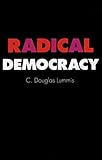Radical Democracy / C. Douglas Lummis.
Material type: TextPublisher: Ithaca, NY : Cornell University Press, [2016]Copyright date: ©2016Description: 1 online resource (200 p.)Content type:
TextPublisher: Ithaca, NY : Cornell University Press, [2016]Copyright date: ©2016Description: 1 online resource (200 p.)Content type: - 9781501712999
- 321.8 23
- JC423
- online - DeGruyter
| Item type | Current library | Call number | URL | Status | Notes | Barcode | |
|---|---|---|---|---|---|---|---|
 eBook
eBook
|
Biblioteca "Angelicum" Pont. Univ. S.Tommaso d'Aquino Nuvola online | online - DeGruyter (Browse shelf(Opens below)) | Online access | Not for loan (Accesso limitato) | Accesso per gli utenti autorizzati / Access for authorized users | (dgr)9781501712999 |
Frontmatter -- contents -- Acknowledgments -- Extracts -- Introduction -- 1. Radical Democracy -- 2. Antidemocratic Development -- 3. Antidemocratic Machines -- 4. Democracy's Flawed Tradition -- 5. The Democratic Virtues -- Conclusion: Persephone's Return -- Notes -- Index
restricted access online access with authorization star
http://purl.org/coar/access_right/c_16ec
C. Douglas Lummis writes as if he were talking with intelligent friends rather than articulating political theory. He reminds us that democracy literally means a political state in which the people (demos) have the power (kratia). The people referred to are not people of a certain class or gender or color. They are, in fact, the poorest and largest body of citizens. Democracy is and always has been the most radical proposal, and constitutes a critique of every sort of centralized power. Lummis distinguishes true democracy from the inequitable incarnations referred to in contemporary liberal usage. He weaves commentary on classic texts with personal anecdotes and reflections on current events. Writing from Japan and drawing on his own experience in the Philippines at the height of People's Power, Lummis brings a cross-cultural perspective to issues such as economic development and popular mobilization. He warns against the fallacy of associating free markets or the current world economic order with democracy and argues for transborder democratic action. Rejecting the ways in which technology imposes its own needs, Lummis asks what work would look like in a truly democratic society. He urges us to remember that democracy should mean a fundamental stance toward the world and toward one's fellow human beings. So understood, it offers an effective cure for what he terms "the social disease called political cynicism." Feisty and provocative, Radical Democracy is sure to inspire debate.
Mode of access: Internet via World Wide Web.
In English.
Description based on online resource; title from PDF title page (publisher's Web site, viewed 26. Apr 2024)


